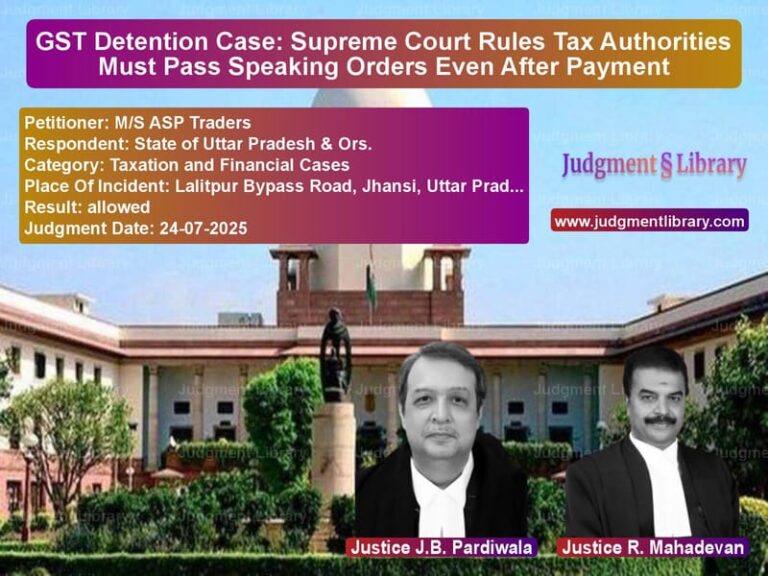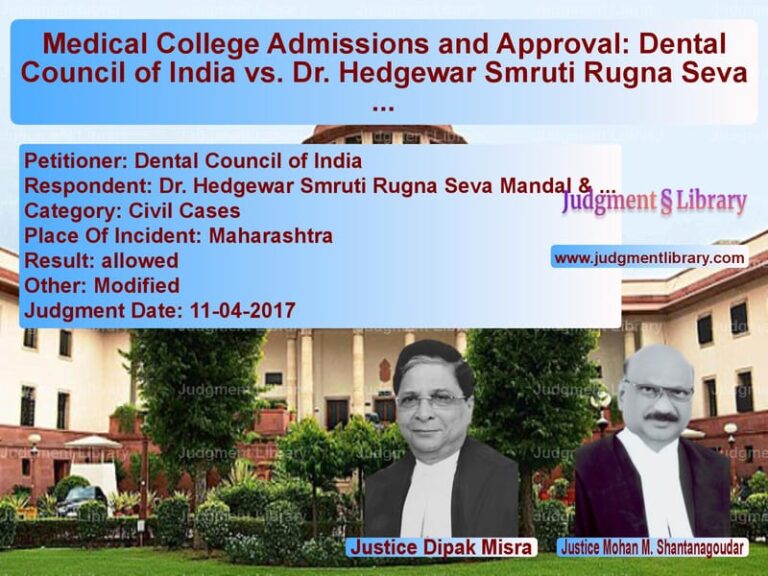Cheque Bounce Case Settled: Supreme Court Quashes Conviction Under Negotiable Instruments Act
The case of Pravind Kumar vs. Radhe Ballabh Mishra & Anr. revolves around a legal dispute under Section 138 of the Negotiable Instruments Act, 1881, concerning dishonored cheques issued in the years 2010 and 2011. The Supreme Court quashed the conviction and sentence after the parties reached a settlement.
Background of the Case
The appellant, Pravind Kumar, was convicted for issuing dishonored cheques totaling Rs. 3 lakhs in favor of the first respondent, Radhe Ballabh Mishra. The trial court found him guilty under Section 138 of the Negotiable Instruments Act (NI Act) and sentenced him accordingly. The conviction was upheld by the lower appellate courts.
The appellant challenged the decision in the Supreme Court, seeking relief on various grounds. However, during the pendency of the appeal, both parties agreed to settle the dispute.
Key Issues in the Case
- Whether a settlement reached during the pendency of a Section 138 NI Act case could be considered grounds to quash the conviction.
- Whether the appellant’s conviction should be upheld despite the full satisfaction of the claim by the respondent.
- What compensation, if any, should be provided to the respondent beyond the principal cheque amount?
Petitioner’s (Appellant’s) Arguments
The appellant, Pravind Kumar, contended:
- The parties had reached a full and final settlement for Rs. 4.5 lakhs, which was more than the amount covered by the dishonored cheque.
- The amount was deposited before the Supreme Court and was directed to be withdrawn by the respondent.
- Since the respondent had received full payment along with litigation expenses, further prosecution would serve no purpose.
- It would be in the interest of justice to quash the conviction since the dispute had been resolved amicably.
Respondent’s Arguments
The respondent, Radhe Ballabh Mishra, agreed to the settlement but sought additional compensation:
- The cheques were issued in 2010 and 2011, and the delay had caused financial loss.
- While he had received Rs. 4.5 lakhs, he was entitled to additional compensation for the long-drawn litigation.
- Further litigation expenses and financial hardship should be taken into consideration.
Supreme Court’s Analysis and Judgment
The Supreme Court, comprising Justices Kurian Joseph and R. Banumathi, acknowledged that the parties had settled the dispute and held that the conviction could be set aside.
1. Settlement as a Ground for Quashing Conviction
The Court noted that Section 138 cases are primarily compensatory in nature and that if the complainant has received the full amount along with additional compensation, further prosecution would be unnecessary.
“Since the first respondent has entered full satisfaction of the payments, and in view of the peculiar facts and circumstances of the transactions leading to the litigation, we are of the view that it will only be in the interest of justice that the criminal proceedings which ended up in the conviction are quashed in order to do complete justice between the parties.”
2. Additional Compensation Awarded
The Court directed that an additional Rs. 50,000 be paid to the respondent:
“Having regard to the fact that the cheques were issued in the years 2010 and 2011, we are of the view that a further payment of Rs. 50,000/- (Rupees Fifty Thousand) would be just, fair, and equitable.”
3. Directions for Fund Disbursement
The Supreme Court instructed the Judicial Magistrate, Pupri at Sitamarhi, Bihar, to distribute the deposited amount:
- Rs. 50,000 was to be paid to the respondent as additional compensation.
- The remaining balance, along with accrued interest, was to be refunded to the appellant.
- The entire process was to be completed within one month from the date of the judgment.
Final Orders
The Supreme Court ruled:
- The conviction and sentence under Section 138 NI Act were set aside.
- The complaint filed before the Judicial Magistrate was dismissed.
- The settlement was accepted as full and final resolution of the dispute.
- The Judicial Magistrate was directed to disburse the funds as per the Court’s instructions.
Legal Implications of the Judgment
1. Encouragement of Settlements in NI Act Cases
The ruling reinforces that in cheque bounce cases, courts favor settlement over prolonged litigation.
2. Compensation Beyond the Cheque Amount
The judgment highlights that additional compensation can be awarded for delay and financial hardship.
3. Quashing of Conviction on Full Payment
The decision clarifies that once the complainant receives full satisfaction of the claim, criminal prosecution can be quashed to ensure justice.
Conclusion
The Supreme Court’s ruling in Pravind Kumar vs. Radhe Ballabh Mishra marks a significant step in ensuring fair outcomes in cheque bounce cases. The decision prioritizes settlement over unnecessary litigation and sets a precedent that encourages accused persons to resolve disputes amicably by making full payments, even after conviction.
Don’t miss out on the full details! Download the complete judgment in PDF format below and gain valuable insights instantly!
Download Judgment: Pravind Kumar vs Radhe Ballabh Mishra Supreme Court of India Judgment Dated 12-07-2017.pdf
Direct Downlaod Judgment: Direct downlaod this Judgment
See all petitions in Cheque Dishonour Cases
See all petitions in Consumer Rights
See all petitions in Judgment by Kurian Joseph
See all petitions in Judgment by R. Banumathi
See all petitions in allowed
See all petitions in Quashed
See all petitions in supreme court of India judgments July 2017
See all petitions in 2017 judgments
See all posts in Civil Cases Category
See all allowed petitions in Civil Cases Category
See all Dismissed petitions in Civil Cases Category
See all partially allowed petitions in Civil Cases Category







